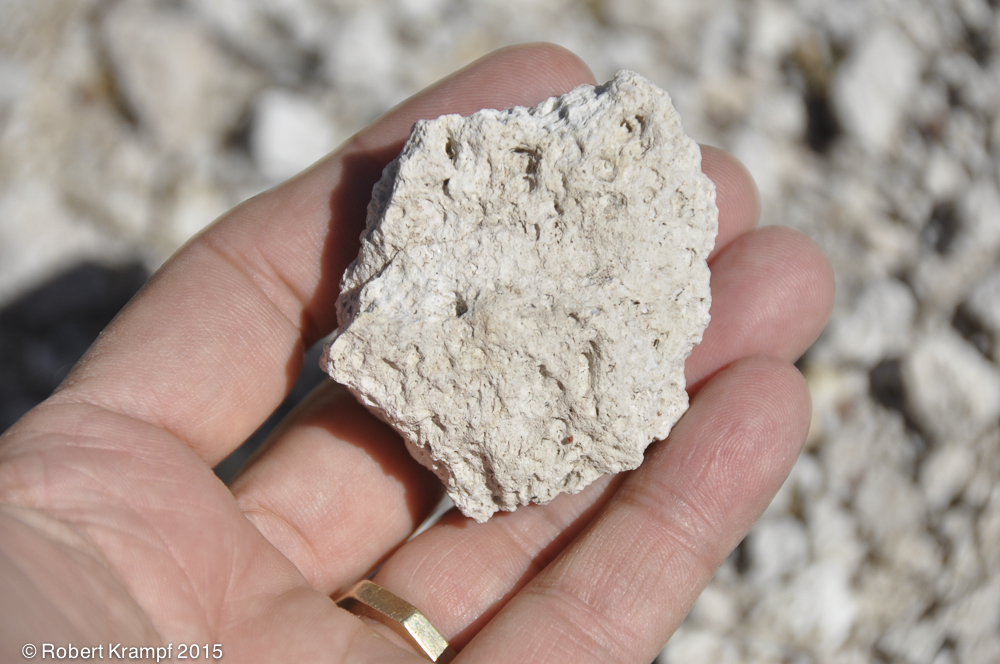
This is called Pumice. It is formed when magma reaches the surface, and reduced pressure lets gas bubbles escape. When it cools, it has so many trapped air bubbles that it will actually float in water. What kind of rock is it?.
-
Igneous
Yes! Igneous rocks formed from magma or lava. This is an igneous rock. -
Sedimentary
No. Sedimentary rocks are deposited by wind, water, ice, or gravity, and they often contain fossils. This is not a sedimentary rock. -
Metamorphic
No. Metamorphic rocks have been changed by heat and pressure from a different kind of rock. Instead of being changed, this got hot enough to completely melt, so it is not metamorphic. -
Pumice is not a rock.
No. Pumice is a naturally occurring solid that forms large layers in the Earth. Pumice is a rock.
Click to see which state standards this question tests, and which of my videos, experiments, and other resources support that topic.
Florida
SC.4.E.6.1 Identify the three categories of rocks: igneous, (formed from molten rock); sedimentary (pieces of other rocks and fossilized organisms); and metamorphic (formed from heat and pressure).
| Evaporites | video, learnalong, checked |
| Igneous Rocks and Bubbles | video, free, learnalong, Updated |
| Sedimentary Rocks | video, learnalong |
| What is a Rock? | video, learnalong, checked |
| Bioclastics: Rocks With No Minerals | video |
| Homemade Fossil Dig | text page |
| Foliated and Unfoliated Rocks | text page, learnalong |
| Identifying Igneous Rocks | text page, learnalong |
| Intrusive and Extrusive Igneous Rocks | text page, learnalong |
| Light and Dark Minerals | text page, learnalong |
| Review Rocks-9 | practice |
| Review Rocks-7 | practice |
| Review Rocks-10 | practice |
| Review Rocks-10 | practice |
| Review Rocks-10 | practice |
| Review Rocks-1 | practice |
| Review Rocks-2 | practice |
| Review Rocks-3 | practice |
| Review Rocks-4 | practice |
| Review Rocks-5 | practice |
| Review Rocks-6 | practice |
| Review Rocks-8 | practice |
SC.7.E.6.2 Identify the patterns within the rock cycle and relate them to surface events (weathering and erosion) and sub-surface events (plate tectonics and mountain building).
| Evaporites | video, learnalong, checked |
| What is a Rock? | video, learnalong, checked |
| The Rock Cycle | video, learnalong |
| Change: Fast and Slow | video |
| Erosion | video, checked |
| Continuous Change | video, checked |
| Bioclastics: Rocks With No Minerals | video |
| Weathering and Erosion | video, learnalong, checked |
| Review Rocks-10 | practice |
| Review Rocks-10 | practice |
| Review Rocks-1 | practice |
| Review Erosion-1 | practice |
| Review Erosion-2 | practice |
| Review Erosion-3 | practice |
| Review Erosion-4 | practice |
| Review Erosion-5 | practice |
| Review Rocks-4 | practice |
| Review Rocks-5 | practice |
| Review Rocks-6 | practice |
| Review Rocks-8 | practice |
| Review Rocks-9 | practice |
| Review Rocks-7 | practice |
Utah
UT.4.III.1.a Describe the differences between minerals and rocks.
| What is a Mineral? | video, checked |
| Identifying Minerals | video, learnalong |
| What is a Rock? | video, learnalong, checked |
| Bioclastics: Rocks With No Minerals | video |
| Definition of a Mineral | video, checked |
| Review Rocks-1 | practice |
| Review Rocks-4 | practice |
| Review Rocks-5 | practice |
| Review Rocks-6 | practice |
| Review Rocks-8 | practice |
| Review Rocks-9 | practice |
| Review Rocks-7 | practice |
| Review Rocks-10 | practice |
NGSS
4-ESS1-1 Identify evidence from patterns in rock formations and fossils in rock layers to support an explanation for changes in a landscape over time.
| Reading the Rocks: Law of Superposition | video |
| Reading the Rocks: Law of Crosscutting | video |
| What is a Rock? | video, learnalong, checked |
| Reading the Rocks: The Present is the Key to the Past | video, ClosedCaptions |
| Paleo Cookies | video |
| Evaporites | video, learnalong, checked |
| Igneous Rocks and Bubbles | video, free, learnalong, Updated |
| Sedimentary Rocks | video, learnalong |
| Homemade Fossil Dig | text page |
| Review Rocks-1 | practice |
| Review Geologic Time-1 | practice |
| Review Rocks-4 | practice |
| Review Geologic Time-2 | practice |
| Review Rocks-5 | practice |
| Review Rocks-6 | practice |
| Review Rocks-8 | practice |
| Review Rocks-9 | practice |
| Review Rocks-7 | practice |
| Review Rocks-10 | practice |
| Review Geologic Time-3 | practice |
MS-ESS2-1 Develop a model to describe the cycling of Earth’s materials and the flow of energy that drives this process.
| Evaporites | video, learnalong, checked |
| Definition of a Mineral | video, checked |
| Igneous Rocks and Bubbles | video, free, learnalong, Updated |
| What is a Mineral? | video, checked |
| Identifying Minerals | video, learnalong |
| Sedimentary Rocks | video, learnalong |
| What is a Rock? | video, learnalong, checked |
| The Rock Cycle | video, learnalong |
| Bioclastics: Rocks With No Minerals | video |
| Light and Dark Minerals | text page, learnalong |
| Review Rocks-7 | practice |
| Review Rocks-10 | practice |
| Review Rocks-10 | practice |
| Review Rocks-10 | practice |
| Review Rocks-1 | practice |
| Review Rocks-2 | practice |
| Review Rocks-3 | practice |
| Review Rocks-4 | practice |
| Review Rocks-5 | practice |
| Review Rocks-6 | practice |
| Review Rocks-8 | practice |
| Review Rocks-9 | practice |
